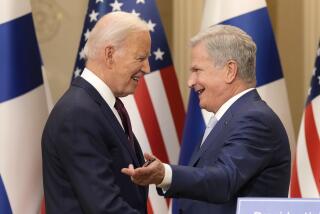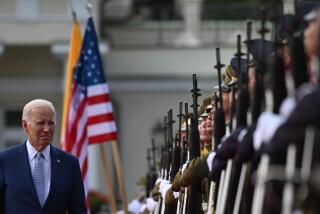Bush Baltic Move Seeks to ‘Keep Pressure’ On : Secession: President recognizes Lithuania, Latvia and Estonia after fruitless wait for Moscow to act.
- Share via
KENNEBUNKPORT, Me. — President Bush extended U.S. diplomatic recognition Monday to the Baltic republics of Lithuania, Latvia and Estonia, marking the first official American sanction of a step toward the breakup of the Soviet Union.
But Bush cautioned that the United States would consider similar declarations by the other secessionist Soviet republics only on a “case by case basis.” Ten of the republics have declared their independence, but some of them also indicated Monday that they might accept a new plan for continued economic ties and other links.
The announcement granting U.S. recognition to the Baltics, which declared their own independence more than a year ago and were recognized in the last week by a cascading number of Western nations, had long been expected.
But Bush had insisted that any such move be postponed as he sought privately to persuade Soviet President Mikhail S. Gorbachev to bow to the inevitable and ensure that the change would be orderly.
Gorbachev did suggest in a television interview Sunday that he would not oppose Baltic independence. But when no such official assurance of Baltics’ recognition had come from Moscow by early Monday, Administration officials said Bush decided to act on his own to “keep the pressure” on Gorbachev to recognize that the changes were irreversible.
The Soviets said Monday that they had delayed consideration of the Baltics issue by their highest legislative body, the Congress of People’s Deputies, because that group was preoccupied with a new proposal to reorganize that nation’s government.
U.S. officials, nevertheless, expressed concern that by outflanking Moscow, the White House risked adding to the disorder that some believe could come, if the way to independence for the Baltics is not smoothed by formal negotiation.
“If the Soviet Union had done it first, it would have helped in so many areas,” one weary White House aide said Monday after Bush announced his decision at a morning news conference on the lawn of his seaside home here on the last day of his summer vacation.
A further sign of that concern about the consequences of Soviet disintegration came as Bush for the first time made explicit his hope that the race toward disunion did not leave the Soviet republics without some central harness.
Although Bush noted that the decision by 10 of the 15 Soviet republics to seek independence and chart their own course was what he called “democracy on the move,” he insisted that on questions of arms control and foreign policy, it would be vital that there be “some government” at the center with which the United States could consult.
The President cautioned against a “mood of euphoria,” which he blamed for a new round of calls for U.S. reductions in spending on security and defense in light of the failed Soviet coup.
And he voiced a flustered pique at those who have questioned the American foreign policy approach that contends both with Gorbachev, who is regarded as sound but politically crippled, and Russian Federation President Boris N. Yeltsin, who is thought to be hugely popular but has been described as demagogic by some U.S. officials. “Policy isn’t based on personality,” Bush said. ‘It’s based on who you’re dealing with.”
But Bush seemed more than at any moment since the coup failure to shed his veil of caution in declaring without equivocation that the tumult since unleashed represents a force for the good.
“I think history will write this month down as one of the most important turning points toward a genuine new world order, and certainly a turning point toward freedom and democracy,” Bush said, adding: “It’s been monumental.”
With Lithuania, Latvia and Estonia now officially regarded by his government as sovereign states, the President immediately dispatched to the region the first U.S. envoy to visit the Baltics since the tiny states were annexed by the Soviet Union half a century ago.
The diplomat, Curtis Kamman, a deputy assistant secretary of state in charge of Soviet affairs, carries instructions to take whatever steps necessary to ensure that Baltic independence becomes a “factual reality,” Bush said.
With U.S. government experts now concerned that republics in Soviet Asia may well face severe food shortages this winter, Bush also ordered a top Agriculture Department official on a separate mission to assess what assistance may be required.
Bush noted that the Soviet people may face “enormous challenges” in the months ahead.
But his comments reflected a continuing refusal to make detailed U.S. commitments, pledging only that the Administration would seek solutions to the food problem “if we determine that one exists.”
That approach to aid, and the White House tack on Baltic recognition, both reflect a strategy that holds out the prospect of assistance as an inducement toward rapid reform while taking care not to undercut Gorbachev--even when he moves too deliberately for White House tastes.
An Administration official said Bush was so determined not to leave the Soviet leader isolated on the question of the Baltics that he last Tuesday postponed his own scheduled announcement and drafted a cable to Gorbachev in the hopes of enlisting him to take the public step first.
The delay left the United States, long the leading advocate of freedom for the Baltics, lagging behind some 40 other countries in recognizing their newly declared independence.
When an aide to Gorbachev on Friday finally responded to a Bush deadline by asking for more time, the President relented. Only on Sunday, when the Soviet leader himself sent a bland cable to Bush that made no mention of the Baltics, did Bush conclude that he had no option but to go forward alone, the official said.
But Bush steered far from criticizing Gorbachev in his public remarks Monday and appeared particularly buoyed by signs of progress in Moscow toward agreement on a new plan backed by the Soviet leader for reorganizing the Soviet government. The plan provides for a measure of central control Bush suggested would be helpful in a future U.S.-Soviet relationship.
The President said he is confident that the Soviet foreign policy apparatus is still sufficiently intact that the unraveling of ties between republics and the center should not adversely affect plans for a joint U.S.-Soviet peace conference on the Mideast.
Recognizing the Baltics
The United States is the 37th state to recognize the Baltic territories of Estonia, Latvia and Lithuania as independent nations. The three had been forcibly absorbed into the Soviet Union in 1940.
Countries that have established diplomatic ties with the Baltic states:
* Denmark
* Finland
* Hungary
* Iceland
* Japan
* Norway
* Sweden
* Switzerland
* United States
Ready to establish ties:
* Argentina
* Australia
* Austria
* Belgium
* Britain
* Bulgaria
* Canada
* Chile
* Cyprus
* Czechoslovakia
* France
* Germany
* Greece
* Ireland
* Italy
* Luxembourg
* Malta
* Mongolia
* Netherlands
* New Zealand
* Poland
* Portugal
* Romania
* South Africa
* Spain
* Turkey
* Uruguay
* Vatican
* The Russian Federation, most powerful of the 15 Soviet republics.
A look at the three states:
* ESTONIA
LEADER--Arnold F. Ruutel
LAND--17,413 square miles
POPULATION--1.5 million
ECONOMY--Timber, agriculture, dairy farming, natural gas.
STATUS--Declared Soviet Union an occupying power March 30,1990, and pledged to restore full independence.
* LATVIA
LEADER--Anatolijs V. Gorbunovs
LAND--24,595 square miles
POPULATION--2.7 million, mostly Latvian and Russian
ECONOMY--Industry, timber, cattle breeding and dairy farming
STATUS--Declared independence May 4, 1990.
* LITHUANIA
LEADER--Vytautas Z. Landsbergis
LAND--25,170 square miles
POPULATION--3.7 million, mostly Lithuanians
ECONOMY--Building ships, industry, and agriculture
STATUS--Declared independence from Soviet rule March 11, 1990.
Source: Times Wire Services
More to Read
Sign up for Essential California
The most important California stories and recommendations in your inbox every morning.
You may occasionally receive promotional content from the Los Angeles Times.













